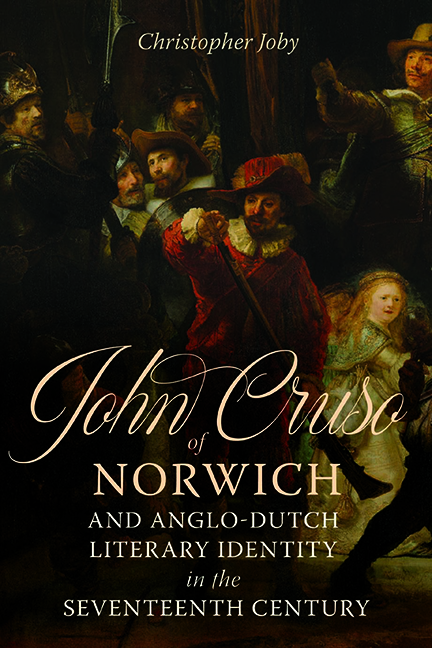Book contents
- Frontmatter
- Dedication
- Contents
- List of illustrations
- Acknowledgements
- Author’s note
- Abbreviations
- Prologue
- 1 Intrat John Cruso
- 2 John Cruso’s school days
- 3 John Cruso’s early adult life
- 4 Cruso’s elegy to Simeon Ruytinck (1622)
- 5 Cruso the English poet
- 6 1632 – Cruso’s annus mirabilis
- 7 Cruso the translator
- 8 Cruso’s 1642 Dutch verses: praise and lamentation
- 9 Cruso and the English Civil Wars
- 10 Cruso the Epigrammatist
- 11 Cruso’s final years
- Epilogue
- Appendix 1 Poems by John Cruso
- Appendix 2 Liminary verses in John Cruso’s English publications
- Bibliography
- Index
- Studies in Renaissance Literature
4 - Cruso’s elegy to Simeon Ruytinck (1622)
Published online by Cambridge University Press: 26 May 2022
- Frontmatter
- Dedication
- Contents
- List of illustrations
- Acknowledgements
- Author’s note
- Abbreviations
- Prologue
- 1 Intrat John Cruso
- 2 John Cruso’s school days
- 3 John Cruso’s early adult life
- 4 Cruso’s elegy to Simeon Ruytinck (1622)
- 5 Cruso the English poet
- 6 1632 – Cruso’s annus mirabilis
- 7 Cruso the translator
- 8 Cruso’s 1642 Dutch verses: praise and lamentation
- 9 Cruso and the English Civil Wars
- 10 Cruso the Epigrammatist
- 11 Cruso’s final years
- Epilogue
- Appendix 1 Poems by John Cruso
- Appendix 2 Liminary verses in John Cruso’s English publications
- Bibliography
- Index
- Studies in Renaissance Literature
Summary
Leiden in the province of Holland had several things in common with Norwich in the early modern period. Both towns were important centres for textile manufacture. Furthermore, they both received many migrants escaping the religious and economic turmoil in the Southern Netherlands. One migrant who reached Leiden was Matthijs Elzevier (1564–1640), who was born in Antwerp. Matthijs's father, Lodewijck (1540–1617), was a bookseller who collaborated with the famous Antwerp printer Christoffel Plantijn (1520–89). In about 1580 Matthijs moved with his family to Leiden, where the university, founded only five years earlier, offered significant opportunities for printers and booksellers. By 1616, one of his sons, Isaac (b. 1596), had established a printing press there. Like John Cruso, Isaac was a second-generation migrant.
In 1622 Isaac published a collection in quarto of twenty-six Latin and Dutch elegies. This collection was arguably the most important Anglo- Dutch literary moment in the seventeenth century. On the title page is the distinctive Elzevier device of a man standing alone next to an elm tree, with the motto ‘non solus’ [not alone]. The motto is thought to point to the symbiotic relationship between printer and author. All the poems in the collection were elegies to the late minister of the Dutch church in London, Simeon Ruytinck. The final poem is a Dutch elegy written by John Cruso, which marked his debut as a published author. To date this collection has received little academic attention, and so this chapter analyzes it in some detail. It begins by analyzing the life and work of Ruytinck, whose passing occasioned such an outpouring of poetic grief. It then analyzes how the collection came into existence and who the likely compiler was, before describing its principal contributors. The picture that emerges is that each contributor had some relation to Ruytinck and the Dutch church in London, as well as to other contributors, including Cruso. Therefore, we can talk in terms of an Anglo-Dutch literary network, for which the Dutch church in London in some sense formed a node for cultural and intellectual exchange.
- Type
- Chapter
- Information
- Publisher: Boydell & BrewerPrint publication year: 2022



